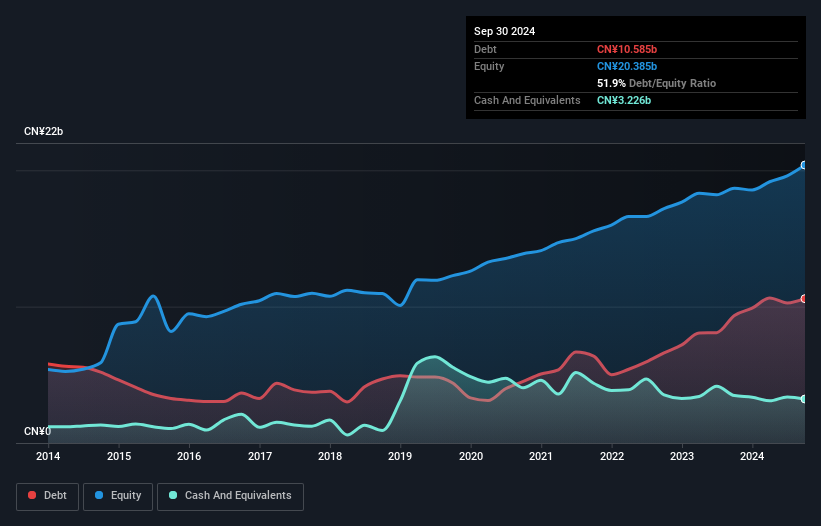Warren Buffett famously said, 'Volatility is far from synonymous with risk.' So it might be obvious that you need to consider debt, when you think about how risky any given stock is, because too much debt can sink a company. We note that Nanjing Gaoke Company Limited (SHSE:600064) does have debt on its balance sheet. But the more important question is: how much risk is that debt creating?
When Is Debt Dangerous?
Debt and other liabilities become risky for a business when it cannot easily fulfill those obligations, either with free cash flow or by raising capital at an attractive price. If things get really bad, the lenders can take control of the business. However, a more frequent (but still costly) occurrence is where a company must issue shares at bargain-basement prices, permanently diluting shareholders, just to shore up its balance sheet. By replacing dilution, though, debt can be an extremely good tool for businesses that need capital to invest in growth at high rates of return. When we examine debt levels, we first consider both cash and debt levels, together.
View our latest analysis for Nanjing Gaoke
What Is Nanjing Gaoke's Net Debt?
As you can see below, at the end of September 2024, Nanjing Gaoke had CN¥10.6b of debt, up from CN¥9.35b a year ago. Click the image for more detail. However, it does have CN¥3.23b in cash offsetting this, leading to net debt of about CN¥7.36b.

How Strong Is Nanjing Gaoke's Balance Sheet?
We can see from the most recent balance sheet that Nanjing Gaoke had liabilities of CN¥14.5b falling due within a year, and liabilities of CN¥4.55b due beyond that. Offsetting these obligations, it had cash of CN¥3.23b as well as receivables valued at CN¥3.04b due within 12 months. So its liabilities total CN¥12.7b more than the combination of its cash and short-term receivables.
This is a mountain of leverage relative to its market capitalization of CN¥13.6b. Should its lenders demand that it shore up the balance sheet, shareholders would likely face severe dilution. The balance sheet is clearly the area to focus on when you are analysing debt. But it is Nanjing Gaoke's earnings that will influence how the balance sheet holds up in the future. So if you're keen to discover more about its earnings, it might be worth checking out this graph of its long term earnings trend.
Over 12 months, Nanjing Gaoke made a loss at the EBIT level, and saw its revenue drop to CN¥2.0b, which is a fall of 70%. To be frank that doesn't bode well.
Caveat Emptor
Not only did Nanjing Gaoke's revenue slip over the last twelve months, but it also produced negative earnings before interest and tax (EBIT). To be specific the EBIT loss came in at CN¥309m. When we look at that and recall the liabilities on its balance sheet, relative to cash, it seems unwise to us for the company to have any debt. So we think its balance sheet is a little strained, though not beyond repair. However, it doesn't help that it burned through CN¥1.4b of cash over the last year. So suffice it to say we consider the stock very risky. When analysing debt levels, the balance sheet is the obvious place to start. However, not all investment risk resides within the balance sheet - far from it. For example Nanjing Gaoke has 2 warning signs (and 1 which is a bit unpleasant) we think you should know about.
If you're interested in investing in businesses that can grow profits without the burden of debt, then check out this free list of growing businesses that have net cash on the balance sheet.
Valuation is complex, but we're here to simplify it.
Discover if Nanjing Gaoke might be undervalued or overvalued with our detailed analysis, featuring fair value estimates, potential risks, dividends, insider trades, and its financial condition.
Access Free AnalysisHave feedback on this article? Concerned about the content? Get in touch with us directly. Alternatively, email editorial-team (at) simplywallst.com.
This article by Simply Wall St is general in nature. We provide commentary based on historical data and analyst forecasts only using an unbiased methodology and our articles are not intended to be financial advice. It does not constitute a recommendation to buy or sell any stock, and does not take account of your objectives, or your financial situation. We aim to bring you long-term focused analysis driven by fundamental data. Note that our analysis may not factor in the latest price-sensitive company announcements or qualitative material. Simply Wall St has no position in any stocks mentioned.
About SHSE:600064
Nanjing Gaoke
Engages in the development of real estate properties in China.
Established dividend payer and fair value.
Market Insights
Community Narratives



